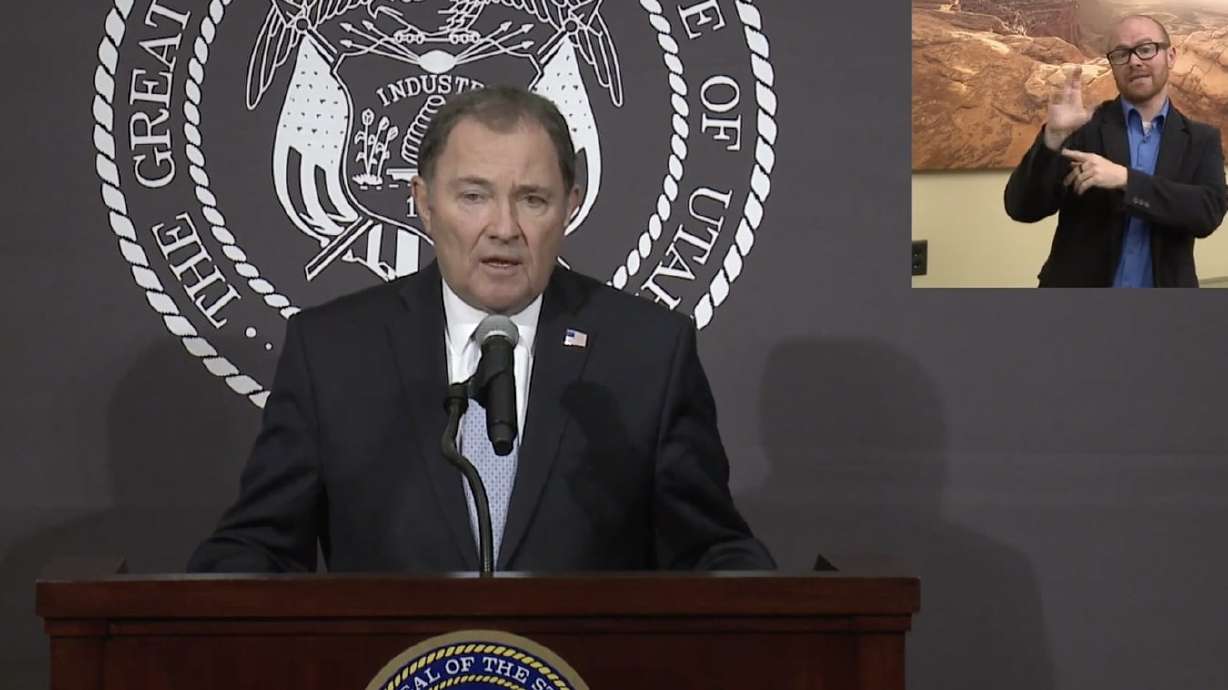Estimated read time: 3-4 minutes
This archived news story is available only for your personal, non-commercial use. Information in the story may be outdated or superseded by additional information. Reading or replaying the story in its archived form does not constitute a republication of the story.
SALT LAKE CITY — The next two weeks for Utah are critical, and the state is still in its "urgent" phase for coronavirus response, but there are encouraging signs and state leaders are doing everything they can to stop the spread of the virus, Gov. Gary Herbert said Tuesday.
"We are very single-minded in our goal," Herbert said during a morning press conference. "We won’t rest until we drive down the transmission rate."
The transmission rate refers to how quickly COVID-19, the disease caused by the novel coronavirus, is being spread from person to person. A transmission rate of 3.0 means that one infected person is likely to pass the disease along to three other people, who in turn would each spread it to three people in a pyramid effect.
A week ago when Herbert announced the state's comprehensive "Utah Leads Together" coronavirus response plan, the transmission rate in the state was about 1.5, and it hasn't changed much since then, Herbert said.
Utah leaders are working to get that rate down to the 0.6-1.0 range, which means the disease would no longer be spreading at an increasing rate, Herbert said.
To drive the rate down, two of the state's top priorities continue to be testing and contact tracing, Herbert said. Health officials currently are able to test about 4,000 people per day, but the state's goal is to test 7,000 per day, Herbert added.
The state's other top priorities include finding and deploying personal protective equipment for healthcare providers, planning for increased hospital activity, planning for economic recovery, and communicating the latest information to the public quickly and effectively, Herbert said.
The state currently has about 27,000 masks, but there is a need for 2-3 million, the governor added. State officials are working with hospitals to see if material from used masks can be recycled instead of discarded.
Federal economic relief will come to Utah soon as a result of the $2.2 trillion Coronavirus Aid, Relief, and Economic Security Act. That will help Utah businesses stay afloat so they can continue employing their workers, Herbert said.
A special session of the Utah Legislature also will likely be necessary in the coming weeks to address budget issues, the governor said. When asked about a possible rent and mortgage payment freeze, he said all options are still on the table but added that he hopes the federal aid package would help businesses and workers across the economy.
Herbert has tapped Utah Department of Public Safety Commissioner Jess Anderson to lead the state's unified command team. Former Utah National Guard Maj. Gen. Jefferson Burton, who recently retired, also has been asked to help lead the Utah Department of Health in its day-to-day operations, Herbert said.
Health department executive director Dr. Joseph Miner is unable to be on the front lines due to some health issues unrelated to COVID-19, Herbert said. Burton has a background in disaster planning and response that will be useful in the ongoing crisis, the governor added.
Though it is difficult to know how many people have contracted COVID-19 and recovered, it is on the radar for state leaders to begin tracking that, Anderson said. It is important for the state to gather the most accurate and complete data available so that it will allow the public to feel confident that the state is responding to the crisis appropriately, Herbert said.
"I’m confident we’re doing everything that can be done. And really, this is a coordinated effort of really everybody working together. And if we do that, we’re going to be OK," Herbert said. "There’s going to be a few weeks of discomfort, but we’re going to get to that stabilization stage, and then we’re gonna go to recovery. And again, it’s going to take all of us working together to do that.”
Herbert and Anderson spoke at a Tuesday morning press conference at the Utah State Capitol. Watch the full replay of the event below.









